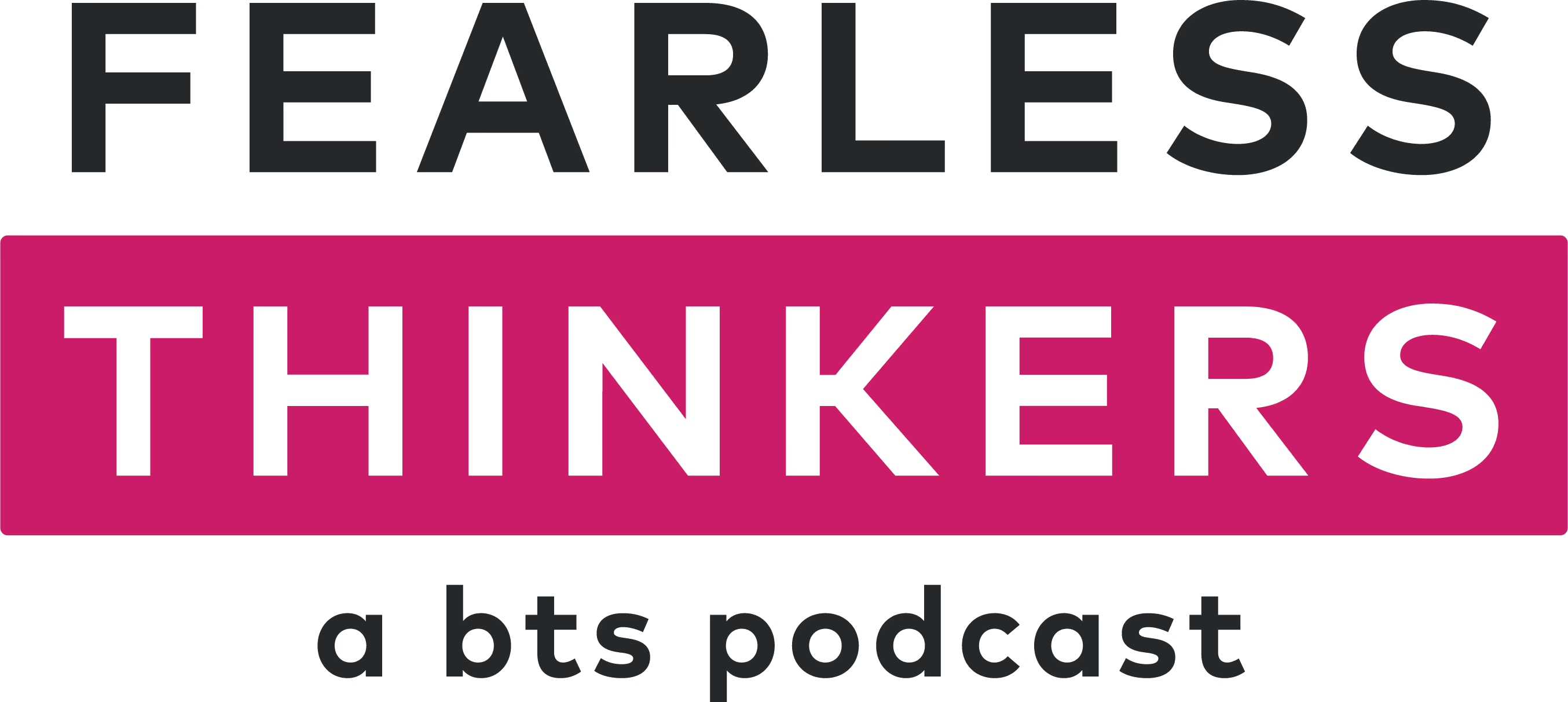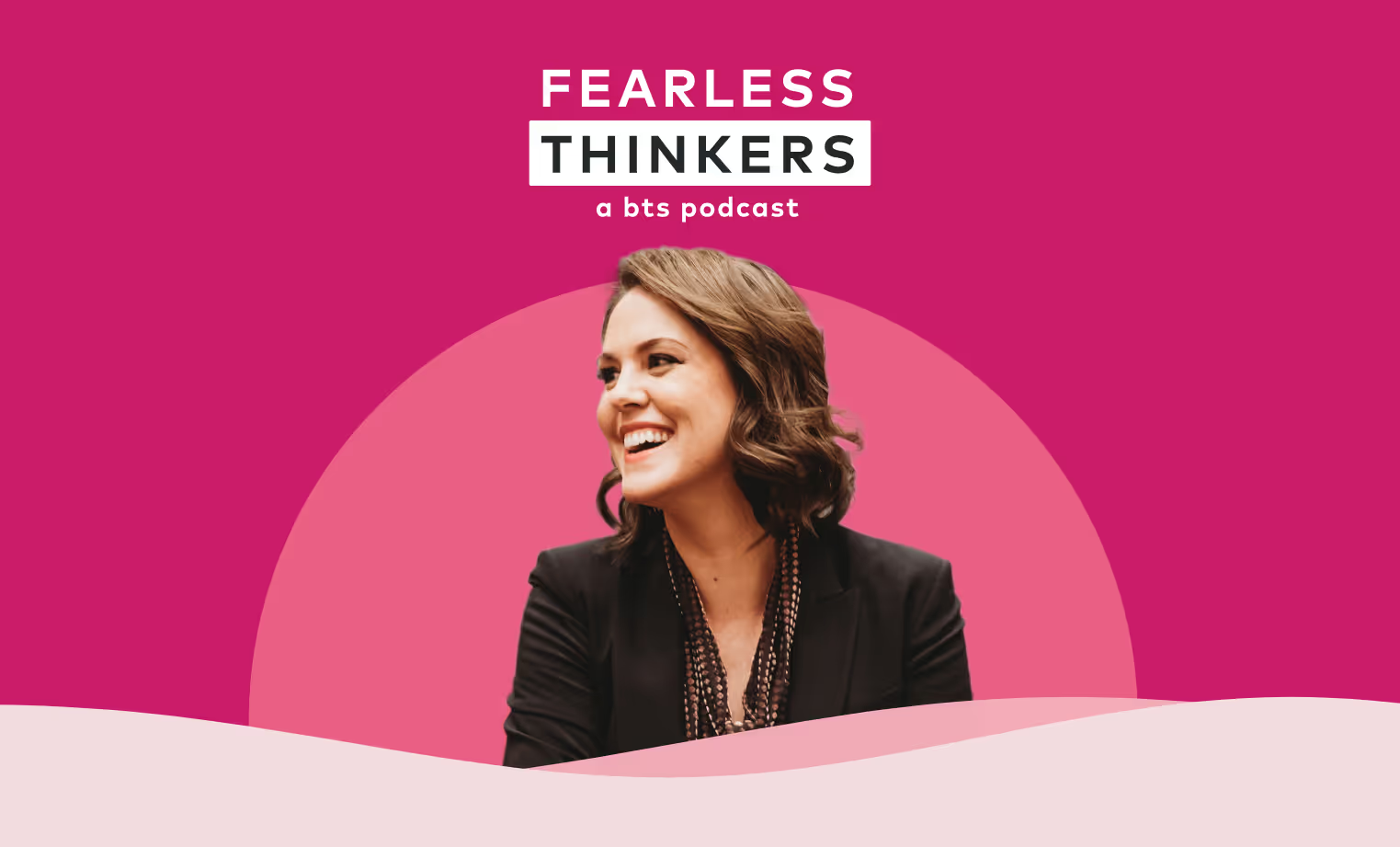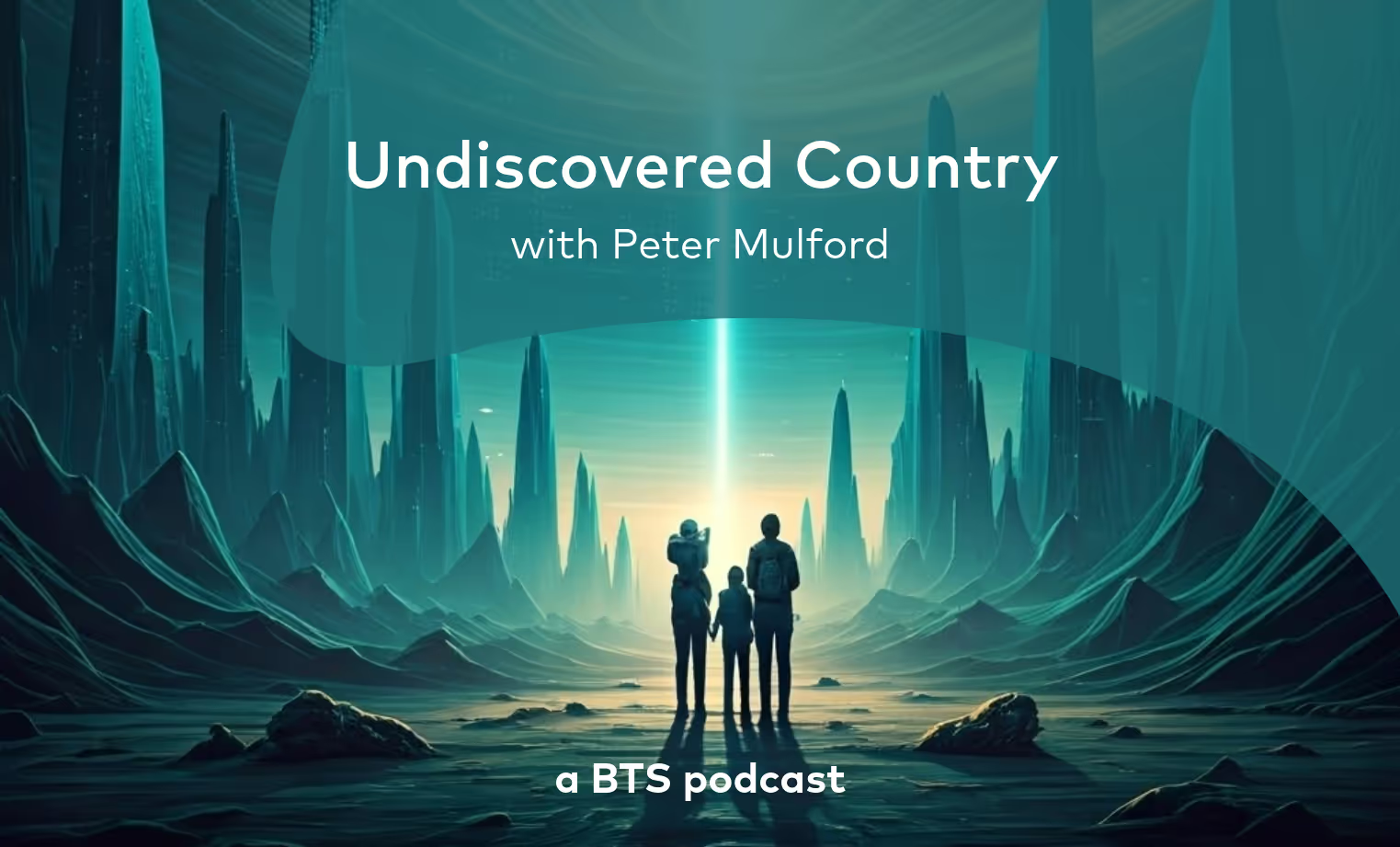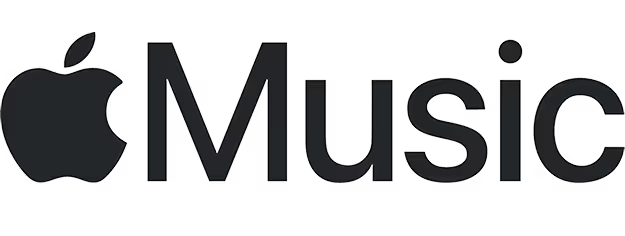Why AI experiments are key to workplace learning

Rebecca Stern, Head of Learning at Udemy, discusses how her team is using AI to build a stronger learning culture . From skills mapping to hands-on experimentation, Rebecca shares how Udemy is helping employees get comfortable with AI, stay curious, and build the skills they need to grow . Listen now!

Most of us want to lead in a way that matters; to lift others up and build something people want to be part of.But too often, we’re socialized (explicitly or not) to lead a certain way: play it safe, stick to what’s proven, and avoid the questions that really need asking.
This podcast is about the people and ideas changing that story. We call them fearless thinkers.
Our guests are boundary-pushers, system challengers, and curious minds who look at today’s challenges and ask, “What if there is a better way?”If that’s the energy you’re looking for, you’ve come to the right place.
Rick: Hey, welcome to Fearless Thinkers, the BTS podcast. I am your host, Rick Cheatham. Today we’re launching another new series where we’re gonna be bringing in great thinkers that are from outside BTS to share a little bit about their experiences and what they’re particularly excited about right now.
So today we have Rebecca Stern from Udemy. She spends some great time with us today talking about how we can make AI accessible and using AI and learning and development. So, let’s jump right in.
Hey Rebecca, welcome to the show.
Rebecca: Hey Rick, thanks for having me.
Rick: So I’m curious, uh, what’s going on in your world?
Rebecca: You know, uh, we are coming down to the end of May. I have two little kids. One of them is graduating kindergarten, so that’s exciting. I’m also really excited that May is about to be over, ’cause have you heard this term Maycember? That some people have been saying that May is the new December where there’s a million events and so many things to do and that has been true in my world.
So, we are almost to graduation, and uh, yeah, I’m really looking forward to that.
Rick: Yeah, I, get it. Well, I really appreciate you joining us today. I think probably the best place for us to start would be if you could just tell us your story a little bit.
Rebecca: Sure, I’m happy to. So, my background is in industrial and organizational psychology. So that’s my educational background. I’ve worked in the learning and development space and leadership development space for many years. I’ve seen the industry from a consulting point of view.
So I spent some years at Deloitte where I worked in our leadership consulting business and really helped start that up. And that was a really fantastic experience. I then moved into a company where I led leadership development and learning internally. And in that role, I started working with vendors in the space like Udemy and it really piqued my interest to say, “You know, I would love to work for a learning company, and see what that is all about.” And so that led me to Udemy and I’m so happy to be here now where I have the pleasure of leading our learning team internally.
Rick: Well, it sounds very familiar. I had a similar path except for most of my journey was in sales and marketing. So, I always joke that basically anything client facing I’ve had to do at one point of in my life. So, sounds like your, uh, your journey in the world of learning and od has been very similar.
Rebecca: Yeah, I’ve got to see it from multiple perspectives, you know, which has been really cool. I’ve been in the consulting seat, I’ve been in the buyer seat, I’ve been in the vendor seat, so it’s been really nice to kind of swap around and see all of those different perspectives, from learning and development.
I’ve also been a learner, right? I’m a lifetime learner. I love to learn. And so I really connect with that user experience.
Rick: Great. so why don’t you tell us a little about what you’re excited about these days.
Rebecca: Yeah, sure. So, my role at Udemy is to lead our learning team. So we are the learning team that supports internal Udemy employees. So it’s a very meta position that I’m in, you know, learning for a learning company. But it’s a lot of fun. So, some of the things that I’m really excited about right now is we are implementing our skills taxonomy.
So we’re mapping skills to every role in the organization. And we’re also doing a lot of upskilling and reskilling around AI that’s such a hot topic. I’m sure a lot of companies are focused on that but for us it’s really meaningful, right? Being in the tech space. AI isn’t a new thing for us, but now that it’s available to everyone in the organization all at once, there’s just so many possibilities that we’re really excited about.
And in order to follow those possibilities and make them come to life, we need our entire population to be really well skilled at AI. And so that’s where my team and my role really come into play is thinking through how do we build that skills at scale.
Rick: Well, I think in a lot of what you just said, that focus that you’ve had on AI really piqued my curiosity because it does seem to be something everyone’s trying to figure out right now. Tell us a little bit about your journey in how you’ve been using AI, how you’ve been making it real in your world.
Rebecca: Yeah, our journey has really spanned a few years now. Right? So we were fairly early adopters, you know, in November of 2022 when ChatGPT was released from OpenAI to the general public. There was a lot of excitement internally. You know, people were really excited to try it out. They were, very excited to have open access to it.
So we started our journey soon thereafter where we really focused on how can we build general knowledge across the organization, because our platform is a marketplace, what we tend to see is that our instructors see opportunities like the release of ChatGPT back in 2022 and they quickly build courses to build knowledge around that new technology or that new subject area that’s emerging.
So we were really fortunate that we use Udemy internally to learn and so we were able to, all take a few courses together as a company and really start to build that foundational knowledge together. Where we’ve moved to in recent years is building knowledge is one step to skill development, but practice is another.
And so this past year we’ve really been focused on experimentation and learning together. So one of the approaches that we’ve taken internally is to continue to keep. Our knowledge fresh on, new tools that are coming out and new skills within the AI space.
But we’re really actively building what we call experiment packs internally that help our. We call our internal employees Udymates, help our Udymates take those skills that they’re learning and apply them in a safe space, right? Try it out on the platform or on a specific AI tool of choice in a kind of low risk environment.
Rick: Wow, that’s really cool that you have that set up. But I, wonder just a little bit, ’cause this is a place where, in BTS we spend a lot of our time thinking about mindsets and what drives adoption of tools like AI or shifts in ways to working. How do you get over that hump that seems to be pretty prevalent out there of just fear?
There seems to be three types of people. There’s kind of the frozen in fear. I’m just gonna wait and see how this turns out, or i’m going to learn as much as I can, as fast as I can. Or there’s kind of like this periphery person that keeps a foot in both worlds and it is just waiting to see who wins.
Rebecca: I love that. Yeah. I think of it as a spectrum, right? Where it’s the skeptics to the early adopters and you see people in the organization all along that spectrum. I think for me, what really helped reframe it for myself even, and, and I’ll say I definitely lean towards the early adopter side of the AI spectrum.
I was very excited about having access and continue to be really excited about the opportunity it presents. But I recently read, a research report from Light Cast called The Rising Storm, and they talk about it from a data perspective. And what really frame up is that, you know, there’s this narrative out there that says AI is gonna take our jobs or it’s gonna replace humans in different types of work. And what they showed through data was that, if you look at it from a generational perspective, boomers are leaving organizations at rates that Gen Z aren’t replacing. So what that will create in the very near future is a worker gap. There will be very critical jobs that boomers held positions at that, no longer will there be enough people to fill those gaps. So I think what this really pushes us to do is think a little bit more creatively about, how we’re using AI in organizations , and really look at it from almost an OD perspective, right?
How can you redesign a workplace where AI is doing some sort of role. It has some sort of workflow application and then where are you using your human assets, because they’re becoming more rare, right? There’s not gonna be as many workers as maybe there has been in previous years. And so I thought that was a really nice piece of, research that can help us think about the problem from a different lens.
Rick: Yeah. Not just the threat or the lack, but more, wait a minute there’s a backfill that needs to happen anyway. So, if I’m understanding you correctly, the opportunity for us is to use these tools, and I’ve heard others say, to kind of, automate more mundane tasks so that we can focus on the ones that are many times higher value, more creative, more challenging.
Am I getting it right?
Rebecca: Yeah, exactly. There is a backfill, right? There’s gonna be a gap of work that needs to be done and not enough people to do it. And I’m quite excited about this opportunity to automate some of the mundane things we do, right? if I never have to schedule another Zoom meeting again and I can build an agent that does that for me, uh, wonderful. That’s great. You know, I can’t wait for that day and that day is probably very soon you know, which is exciting.
Rick: It’s funny ’cause not too long ago I was testing one of those apps that you put on your phone that takes notes for you in meetings. And I linked it to my Zoom, I linked it to my, teams and all of a sudden people were like, wait, what is this note taker thing?
Like, they were uncomfortable with it. And I was like, okay, you know what? I’m just gonna turn it off. I thought I turned it off, but because I didn’t uninstall it from my phone, I was on a flight and get a little buzz on my phone that was like, Hey, here’s what happened in the meeting you missed. So the AI agent went to the meeting without me.
Took pretty good notes, had very clear action items for me. It kind of blew my mind, but then we started laughing that, you know, someday the meetings are just gonna be our AI agents talking to each other.
Rebecca: Yeah, I mean, it’s a wild problem to think through then ’cause then you think about, well, why do we gather, right? What is the purpose of a meeting? If the notes that we’re getting from that, we didn’t need to be there to have a conversation or discuss something, then was that truly a meeting?
Right? Was that meeting necessary? And so I, I think sometimes we think about those tools as great, like something to take notes from me, but I’m more curious about asking the question. Can those tools help us identify, high value conversations that we need to have versus where maybe we’re meeting just to meet. And that could have been an email, right? Or that could have been a message.
Rick: Yeah, years ago we had a conference and we handed out little ribbons for people to, take back to their workplaces. That said, I survived a meeting. That should have been an email.
Rebecca: everyone’s earned those ribbons, I’m sure.
Rick: Exactly. Well, so I’m wondering if you could, give me a, couple of more examples of where you’ve seen AI making an early difference in the world of learning.
Rebecca: Yeah, I’d be happy to share a few, one for us on the learning team specifically. We started, I’d say about a year ago having what we call, AI innovation hours. So about a Friday, every other month. It’s not super frequent, but it’s time that we set aside and dedicate just to learning and innovating.
And what we do during those AI innovation hours is we pick a new AI tool, you know, one that we’ve seen advertised, one that we’re curious about. Sometimes those are even tools that we already use internally that we’d like to explore more deeply. And what we do is we start to experiment with that tool.
Sometimes it’s work related, sometimes it’s not. So for example, we explored a new sound creation tool that will take a general prompt or a general input and it will generate a song, from the direction that you give it.
And through that really play and experimentation, it led one of our teammates to come up with a really creative idea for how to announce project updates, to, particular audience by creating music videos. Um, so what he did was he took. A sound creation tool, an AI video creation tool, and then use our internal AI,
Rebecca: called token to develop scripts and put together these really creative, you know, one or two minute music videos to announce, like upcoming updates to the project.
And it really presented a creative, fresh way to communicate and to connect with other people that just gave you a break from the normal Slack update that you get. And that solution wouldn’t have been possible if we weren’t actively experimenting and being creative together as a team.
Rick: Wow. I absolutely love that. It is amazing how quickly, great ideas that we’ve all had to let go of in the past, can materialize so quickly like that even for internal communications and things as you just described.
Well, so I’m always curious, especially when we have, a great guest on like you, what is your advice for someone who’s out there that doesn’t necessarily have the ability to, change the way their organization works, but wants to go further down the path that you are already on?
What would you tell them?
Rebecca: Yeah, I would tell it to start really small, , even if it’s five minutes in your day where you sign up for a ChatGPT account or, you know, pick your favorite AI tool of choice. You can play with those tools without using any of your sensitive work data. You know, you can use it in your personal life. You can use it for creative ventures that you might have on your to-do list, but it helps you at least play an experiment and start to build that skill early. I’ve been partnering internally with our CSO very closely to roll out our upskilling program for the organization.
And the one thing he always says that really has stuck with me and resonates is that people in organizations are gonna use AI whether you tell them they’re allowed or not. So it actually is a of a great benefit to you in an organization if you’re leading these sorts of efforts, get out there really early and often and fast with here’s our approved AI tools and here’s how you should be thinking about putting data into them.
Because then at least gives your organizations, some guidelines. So if you are in a, organization where you feel like you’re not quite sure what you’re allowed to put in, use it in your personal life first, get creative there. I’ll give a great example of, one way that I’ve personally used it that has really changed the way I think about meal planning.
So Rick, have you ever stood in front of your refrigerator and said, what am I gonna make for dinner?
Rick: Only on days that end in Y.
Rebecca: Yeah, exactly. So it’s a really common human challenge, right? So I often stand in front and, you know, I look at my partner and I say, what are we gonna make for dinner? What I’ve done is to, you know, you can take a picture of your refrigerator, pop it into your AI tool of choice and say, first tell me everything you see in this picture. You know, like catalog my refrigerator, then give me some recipe ideas of what I can make with what’s in my refrigerator. And it’s pretty amazing. Like you’ll get back some really great recipes. You could even give it prompt instructions, like assume I have some normal pantry items like flour and sugar available. And it’s one thing that’s just radically changed my personal life. It makes , Meal planning a lot more fun and creative when you have an assistant there that can give you some creative ideas.
Rick: That is so cool. Wow. All right, so now I got another one I gotta download.
Rebecca: Yeah, you can do the same thing with closet organization if you’ve ever struggled with organization of, things. So another personal life, uh, way to experiment with AI.
Rick: Love it. Love it. Well, hey Rebecca, thank you so much for joining us today. I’m sure our audience got a lot of great ideas and things that they can go try. Really appreciate the time.
Rebecca: You’re welcome. Thanks for having me.
Rick: Thanks for joining me today. It’s always a pleasure to bring to you our fearless thinkers. If you’d like to stay up to date, please subscribe. Bios for our guests and links to relevant content are always listed in the show notes. If you’d like to get in touch, please visit us at bts.com. And thanks so much for listening.
Related Content

lorem ipsum

lorem ipsum

lorem ipsum




.svg)